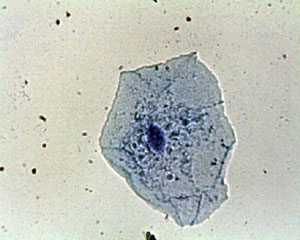 The author feeling cheekyLast Monday I finally took my show out on the road. At The Tech Museum I run hands on genetics programs for visitors. On Monday, we took them to Overfelt High School in San Jose.
The author feeling cheekyLast Monday I finally took my show out on the road. At The Tech Museum I run hands on genetics programs for visitors. On Monday, we took them to Overfelt High School in San Jose.
And the students had a blast*. They got to take home 4X6 glossy pictures of their cheek cells like the one I posted here (that's my handsome cell). They got to use DNA from a crime scene to solve a murder. They got to make bacteria glow like a jellyfish. They got to spool their own DNA. And they got to learn what 1000-2000 bases of their DNA looks like.
For the most part they were genuinely excited and engaged in the activities. They learned about nuclei, dominant and recessive gene versions, why blood cells look different from nerve cells and lots more.
Some educators call this sort of thing "drive-by science." A scientist zooms in, wows the kids and then disappears. These educators feel that this sort of thing has little effect on learning science. I beg to differ.
This experience obviously can't replace classroom learning. But it can reinforce what they've already learned. And it can show them how exciting science really is (even if their textbooks have convinced them otherwise).
